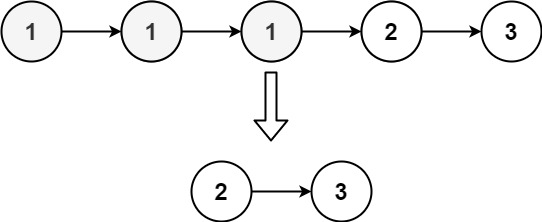C++
Java
Python
Python3
C
C#
JavaScript
Ruby
Swift
Go
Scala
Kotlin
Rust
PHP
TypeScript
Racket
Erlang
Elixir
Dart
monokai
ambiance
chaos
chrome
cloud9_day
cloud9_night
cloud9_night_low_color
clouds
clouds_midnight
cobalt
crimson_editor
dawn
dracula
dreamweaver
eclipse
github
github_dark
gob
gruvbox
gruvbox_dark_hard
gruvbox_light_hard
idle_fingers
iplastic
katzenmilch
kr_theme
kuroir
merbivore
merbivore_soft
mono_industrial
nord_dark
one_dark
pastel_on_dark
solarized_dark
solarized_light
sqlserver
terminal
textmate
tomorrow
tomorrow_night
tomorrow_night_blue
tomorrow_night_bright
tomorrow_night_eighties
twilight
vibrant_ink
xcode
上次编辑到这里,代码来自缓存 点击恢复默认模板
/**
* Definition for singly-linked list.
* struct ListNode {
* int val;
* ListNode *next;
* ListNode() : val(0), next(nullptr) {}
* ListNode(int x) : val(x), next(nullptr) {}
* ListNode(int x, ListNode *next) : val(x), next(next) {}
* };
*/
class Solution {
public:
ListNode* deleteDuplicates(ListNode* head) {
}
};
运行代码
提交
javascript 解法, 执行用时: 72 ms, 内存消耗: 50.2 MB, 提交时间: 2024-01-15 00:04:49
/**
* Definition for singly-linked list.
* function ListNode(val, next) {
* this.val = (val===undefined ? 0 : val)
* this.next = (next===undefined ? null : next)
* }
*/
/**
* @param {ListNode} head
* @return {ListNode}
*/
var deleteDuplicates = function(head) {
if (!head) {
return head;
}
const dummy = new ListNode(0, head);
let cur = dummy;
while (cur.next && cur.next.next) {
if (cur.next.val === cur.next.next.val) {
const x = cur.next.val;
while (cur.next && cur.next.val === x) {
cur.next = cur.next.next;
}
} else {
cur = cur.next;
}
}
return dummy.next;
};
golang 解法, 执行用时: 4 ms, 内存消耗: 2.7 MB, 提交时间: 2024-01-15 00:04:23
/**
* Definition for singly-linked list.
* type ListNode struct {
* Val int
* Next *ListNode
* }
*/
func deleteDuplicates(head *ListNode) *ListNode {
if head == nil {
return nil
}
dummy := &ListNode{0, head}
cur := dummy
for cur.Next != nil && cur.Next.Next != nil {
if cur.Next.Val == cur.Next.Next.Val {
x := cur.Next.Val
for cur.Next != nil && cur.Next.Val == x {
cur.Next = cur.Next.Next
}
} else {
cur = cur.Next
}
}
return dummy.Next
}
java 解法, 执行用时: 0 ms, 内存消耗: 41.7 MB, 提交时间: 2024-01-15 00:04:04
/**
* Definition for singly-linked list.
* public class ListNode {
* int val;
* ListNode next;
* ListNode() {}
* ListNode(int val) { this.val = val; }
* ListNode(int val, ListNode next) { this.val = val; this.next = next; }
* }
*/
class Solution {
public ListNode deleteDuplicates(ListNode head) {
if (head == null) {
return head;
}
ListNode dummy = new ListNode(0, head);
ListNode cur = dummy;
while (cur.next != null && cur.next.next != null) {
if (cur.next.val == cur.next.next.val) {
int x = cur.next.val;
while (cur.next != null && cur.next.val == x) {
cur.next = cur.next.next;
}
} else {
cur = cur.next;
}
}
return dummy.next;
}
}
cpp 解法, 执行用时: 12 ms, 内存消耗: 11.2 MB, 提交时间: 2024-01-15 00:03:45
/**
* Definition for singly-linked list.
* struct ListNode {
* int val;
* ListNode *next;
* ListNode() : val(0), next(nullptr) {}
* ListNode(int x) : val(x), next(nullptr) {}
* ListNode(int x, ListNode *next) : val(x), next(next) {}
* };
*/
class Solution {
public:
ListNode* deleteDuplicates(ListNode* head) {
if (!head) {
return head;
}
ListNode* dummy = new ListNode(0, head);
ListNode* cur = dummy;
while (cur->next && cur->next->next) {
if (cur->next->val == cur->next->next->val) {
int x = cur->next->val;
while (cur->next && cur->next->val == x) {
cur->next = cur->next->next;
}
}
else {
cur = cur->next;
}
}
return dummy->next;
}
};
python3 解法, 执行用时: 48 ms, 内存消耗: 15 MB, 提交时间: 2022-08-29 11:15:37
# Definition for singly-linked list.
# class ListNode:
# def __init__(self, val=0, next=None):
# self.val = val
# self.next = next
'''
一次遍历,
'''
class Solution:
def deleteDuplicates(self, head: ListNode) -> ListNode:
if not head:
return head
dummy = ListNode(0, head)
cur = dummy
while cur.next and cur.next.next:
if cur.next.val == cur.next.next.val:
x = cur.next.val
while cur.next and cur.next.val == x:
cur.next = cur.next.next
else:
cur = cur.next
return dummy.next

